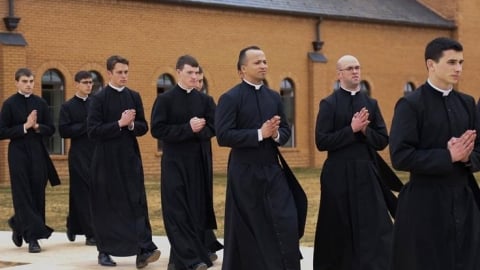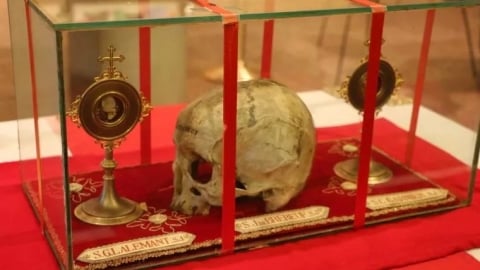To Be a Priest

What is it to be a priest? To understand What the vocation to the priesthood, its sublimity and sacredness, let us recall the scene in which our divine Saviour asked St. Peter, "Simon, son of John, lovest thou Me more than these?" Thrice St. Peter answered in the affirmative, and, after each protestation of love, Christ said to him, "Feed My lambs."
In these words Christ very clearly reveals to us the lifework of the priest. It is the same as Christ's: his joys are those of Christ, so, too, his sorrows, his glory and his reward.
The "lambs" whom the priest is to feed are all men and women. For their souls the priest must pray, labor, suffer and, if need be, die. He feeds the lambs by means of preaching and the sacraments.
He feeds first the minds of Christ's children by teaching them divine truth. Once he has gained their minds, he inflames their hearts with divine love and moves their wills to keep God's holy law which brings them happiness in time and in eternity. What a sublime work!
Noble as is the work of teaching the sciences, how unimportant it is compared with that teaching which consists in revealing God to man! What young man who recalls God's love for him, does not see the sublimity of a life consecrated to making God known and loved? How attractive, interesting, and appealing the work of the pulpit, in which the priest can and should use every means natural and supernatural in order to present successfully divine truth. The priest who understands the importance which Christ attaches to preaching and who perseveres in his efforts to preach well has all the interest and satisfaction of the writer, philosopher, and actor.
All this he experiences in this life, and his reward in the life to come is described in the words of the inspired writer, "They who instruct many to justice shall shine as the stars for all eternity."
The priest feeds the lambs of Christ secondly by means of the sacraments. Among the powers conferred on him at his ordination let us consider two, those which he exercises in the Holy Sacrifice of the Mass and in the tribunal of penance.
He has received the power of changing bread and wine into the Body and Blood of Jesus Christ. This power Christ conferred upon him at the Last Supper in the words "This is My Body, which is given for you. Do this for a commemoration of Me." In like manner the chalice also, after He had supped, saying: "This is the chalice, the new testament, in My Blood which shall be shed for you."
Christ also conferred on His priests the power to forgive sin. "As the Father hath sent Me, I also send you. Go, teach all nations, baptizing them in the name of the Father and of the Son and of the Holy Ghost." "Whatsoever you shall bind on earth shall be bound in heaven; and whatsoever you shall loose on earth shall be loosed also in heaven."
By reason of the power conferred upon him the priest applies to the souls of men the Precious Blood of Jesus Christ, healing them of the foul and deadly disease of sin. In this sacrament of mercy the priest reconciles sinners with God their Father, restores to them divine grace, the principle of supernatural life, bringing peace and joy to their souls, snatching them from unending misery and pain, to make them heirs to everlasting life.
To save souls with Christ - how noble, how sublime-how divine a life!





